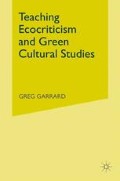Abstract
The long tradition of pastoral and the Romantic movement of the nineteenth century have given critics plenty of experience in thinking about how literary works consider the human place in nature. What is new about ecocriticism is its implicit congruence with the sciences that tell us about Earth’s history, the relation of humans to other life forms, balances and disruptions in living systems. Dana Phillips charges that ecocritics, like too many environmental activists, have been motivated by naive ideas about harmony and holism. Indeed, he says that in spite of appeals to interdisciplinarity or transdisciplinary practice, ‘ecocriticism has been lamentably under-informed by science studies, philosophy of science, environmental history, and ecology’, subjects which professional responsibility ought to require us to know (Phillips 2003, pp. viii–ix). My object here will be to comment on the uneasy relations between literature and science, to discuss the ways writers and literary scholars have appealed to ecological concepts and to talk about how one might gain a working familiarity with ecological and evolutionary science. Then I shall illustrate how an ecocritical pedagogy can explore scientific and environmental emphases in contemporary literature.
Access this chapter
Tax calculation will be finalised at checkout
Purchases are for personal use only
Preview
Unable to display preview. Download preview PDF.
Works cited
D. Albright (1997) Quantum Poetics: Yeats, Pound, Eliot, and the Science of Modernism (New York: Cambridge University Press).
T.F.H. Allen and T.B. Starr (1988) Hierarchy: Perspectives for Ecological Complexity (Chicago: University of Chicago Press).
W.H. Auden (1991) W.H. Auden: Collected Poems, ed. E. Mendelson (New York: Vintage International).
G. Beer (1983) Darwin’s Plots: Evolutionary Narrative in Darwin, George Eliot and Nineteenth-Century Fiction (London: Routledge & Kegan Paul).
— (1996) ‘Physics, Sound, and Substance: Later Woolf’, in Virginia Woolf: The Common Ground — Essays by Gillian Beer (Ann Arbor: University of Michigan Press).
S.J. Gould (2003) The Hedgehog, the Fox, and the Magister’s Pox: Mending the Gap Between Science and the Humanities (New York: Harmony Books).
B. Greene (1999) The Elegant Universe: Superstrings, Hidden Dimensions, and the Quest for Ultimate Theory (London: Vintage).
D. Haraway (1989) Primate Visions: Race, Gender, and Nature in the World of Modern Science (New York: Routledge).
J. Jeans (1942) Physics and Philosophy (Cambridge: The University Press).
D.R. Keller and F.B. Golley (2000) The Philosophy of Ecology: From Science to Synthesis (Athens, GA: University of Georgia Press).
B. Latour (1993) We Have Never Been Modern, trans. Catherine Porter (Cambridge, MA: Harvard University Press).
F.R. Leavis (1962) Two Cultures? The Significance of C. P. Snow (London: Chatto & Windus).
R. Levins and R. Lewontin (1980) ‘Dialectics of Reductionism in Ecology’, Synthese 43:1, 47–78.
A. Lingis (2003) ‘Animal Body, Inhuman Face’, in Zoontologies, ed. Cary Wolfe (Minneapolis: University of Minnesota Press), 165–182.
G.A. Love (2003) Practical Ecocriticism: Literature, Biology, and the Environment (Charlottesville: University of Virginia Press).
L. Margulis (1998) Symbiotic Planet: A New Look at Evolution (New York: Basic Books).
M.J. Marples (1969) ‘Life on the Human Skin’, Scientific American 220, 108–115.
D. Phillips (2003) The Truth of Ecology: Nature, Culture, and Literature in America (New York: Oxford University Press).
S. Pickett, J. Kolasa, and C. Jones (2007) Ecological Understanding: The Nature of Theory and the Theory of Nature (Amsterdam: Elsevier).
W. Reiners and J. Lockwood (2010) ‘Causes of Ecology’s Conceptual Confusion’, in Philosophical Foundations for the Practices of Ecology (Cambridge: Cambridge University Press), 37–66.
D. Simberloff (June 2004), ‘Community Ecology: Is it Time to Move On?’ The American Naturalist 163, 787–799.
C.P. Snow (1959) The Two Cultures and the Scientific Revolution (New York: Cambridge University Press).
L. Westling (1999) ‘Virginia Woolf and the Flesh of the World’, New Literary History 30, 855–875.
R. Whelan (2010) ‘Fifty Years On, C.P. Snow’s Two Cultures Are United in Desperation’, The Telegraph, www.telegraph.co.uk/technology/5273453/Fifty-years-on-CP-Snows-Two-Cultures-are-united-in-desperation.html, accessed 6 May 2011.
E.O. Wilson (1998) Consilience: The Unity of Knowledge (New York: Random House).
Copyright information
© 2012 Louise Westling
About this chapter
Cite this chapter
Westling, L. (2012). Literature and Ecology. In: Teaching Ecocriticism and Green Cultural Studies. Palgrave Macmillan, London. https://doi.org/10.1057/9780230358393_7
Download citation
DOI: https://doi.org/10.1057/9780230358393_7
Publisher Name: Palgrave Macmillan, London
Print ISBN: 978-1-349-31370-9
Online ISBN: 978-0-230-35839-3
eBook Packages: Palgrave Literature CollectionLiterature, Cultural and Media Studies (R0)

